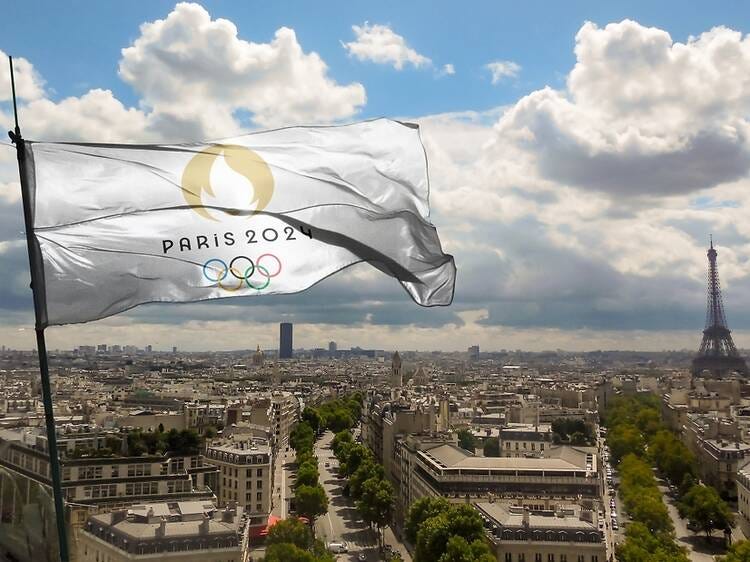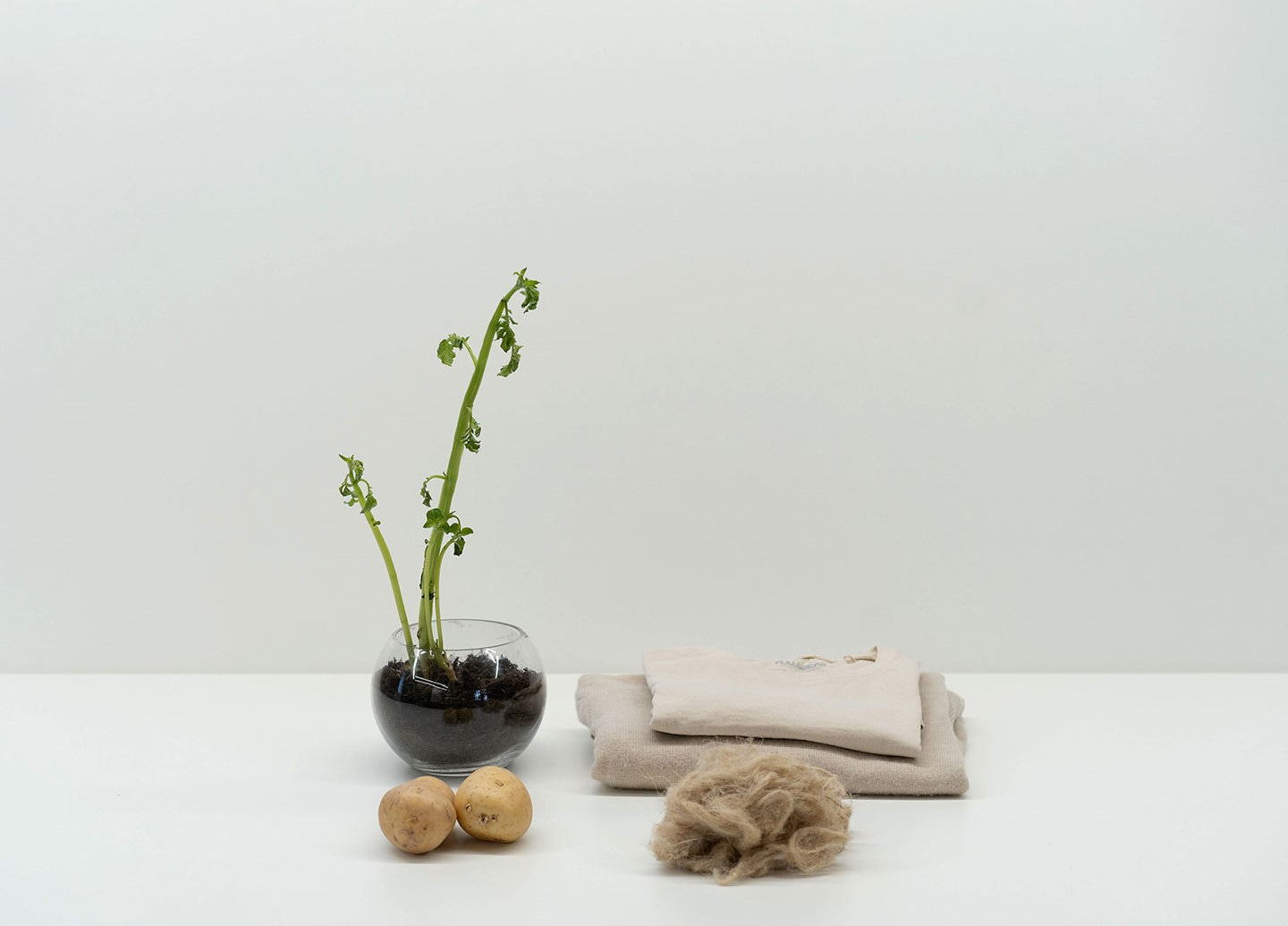🌱 How will the 2024 Olympic Games cut emissions in half?
+ we look at how other sporting events have worked with consumer brands
Happy Monday! Every Monday we suit up and get serious - digging into a climate topic, rounding up the past week’s Good(s) News and sharing updates from across FTF, so you’re never out of the loop.
Are you one of the 3 billion+ people who like to tune into the Olympics? With an audience of that size, the 2024 Paris Olympics and Paralympics have an amazing opportunity to inspire people all over the world… not only to unleash your inner elite athlete with a little impromptu race walking to the shops (watch those hips go!), but also to show us all that environmental action can be delivered at huge scale. If you think about it, setting up the Olympic village is like creating a small town, perfect for a little social experimentation. Join us as we explore what the targets are for this year and how the organisers hope to achieve them.
Let the games begin…
> In Focus
Kickin’ Emissions at the 2024 Olympics
The Olympics start on Friday. And with the media sports, especially women’s, have garnered this year, it’s sure to be a big one.
The Paris 2024 Olympic Games will be like no other. Four new sports have been added, not to mention it’s probably the first time a mayor has had to go for a public dip in the swimming venue to ensure athletes are safe from contamination. In addition, there will be a strong encouragement for athletes, who many perceive to be mega-carnivores, to embrace plant-based options. Will athletes and spectators embrace this? Can the plant-based diet crack into a segment so passionate about their protein?
Slicing impact in half
The strong push for plant-based options and other carbon reduction measures is rooted in the event's goal to halve the carbon footprint of this event in comparison to London 2012 and Rio 2016. Even Scope 3 emissions, such as spectator travel, are being accounted for. It’s the first Games aiming to be aligned with the 2015 Paris Agreement.
Some strategies to achieve this have included renting equipment, or planning for equipment’s second life when not possible to rent, and minimizing the use of diesel generators. Another major priority has been the food, a significant impact driver, considering approximately 13 million meals will be served at the Games.
According to the International Olympic Committee, there are four main ways by which the Games are trying to halve the carbon footprint compared to an average French meal:
Doubling plant-based ingredients and increasing plant-based options;
Sourcing 80% of ingredients locally;
Cutting food waste by focusing on good estimates, redistribution, and composting;
Cutting single-use plastic in half.
Coca-Cola’s installation of water and soda fountains, and the permitted of reusable bottles, should significantly help with #4. It will also be the first time the Olympic Village uses reusable dishware, not disposable.

Visions of vegetables
Leading the charge on the Games’ Food Vision is Sodexo Live! As a corporation, Sodexo hasn’t had a gleaming record in the past, but does rank in the top 10% in the S&P Global ESG Score in its category. They’ve dedicated two years and 20 executive chefs to refining the Olympic menu, which includes 500 items to serve the palettes of hungry athletes from 206 countries. Though the menu will still include animal products, it also offers vegetarian bourguignons, shakshoukas, and moussakas. Oh, and baguettes around every corner. The event chefs have vetoed avocado (unsustainable sourcing) and even the French classic foie gras (which requires birds to be inhumanely overfed).
The Olympics are also partnering with Nestle-owned consumer goods brand Garden Gourmet. Their plant-based burgers, sausages and filets will help keep meals within a 1kg carbon budget.
La Concorde, the site of events like BMX and skateboarding, will even host a 100% vegan restaurant where sports fans can enjoy revisited classics, including a legume-based hot dog with crispy onions, pickled red cabbage, and honey mustard.
Sustainable swaps, beyond the Games
These moves toward sustainability aren’t a first in the sports world. Sustainable solutions have slowly been infiltrating sporting events through leading consumer goods companies. Last month, Notpla supplied Wimbledon 2024 with seaweed-coated boxes for the iconic strawberries and cream and evian provided tournament-goers with reusable options for accessing mineral water. Red Bull UK now requires every sport, culture and athlete based event to comply with its sustainable event policy AND carbon footprinting requirements. Forest Green Rovers, the first carbon-neutral football club, has replaced all stadium dairy (including its ice cream) with Oatly and features Quorn’s vegan options in its “meat” pie.

It’ll be an interesting industry indicator for both the plant-based food and sustainable events sectors to see if athlete’s push back against plant-based options and other sustainability measures at the upcoming Olympics or if they’ll be an actor for turning the tides like tennis star Novak Djokovic has been for years.

Follow up with…
Strategy: IOC Sustainability Strategy
Article: Sustainable procurement for sports events: Lessons from London 2012, The Sustainability Report
> Sponsor Spotlight
Zevero has worked with brands like MOTH, waterdrop, NICE Drinks and KERB. Today, they’re inviting Following The Footprints readers (that’s you) to a free 30-minute call to see how they can help you or answer any burning sustainability questions.
> Last week in consumer goods x climate…
The Good(s) News
Up and coming brands…
🎯 Abel & Cole announced that they just won the Gold Award for 'Sustainable Innovation of the Year' at the 2024 Environmental Packaging Awards. Their ground-breaking Club Zero Refillable Milk Bottle impressed the judges as an effective way to use plastic packaging responsibly and sustainably.
🎯 KraveBeauty announced that they are now B Corp certified.
🎯 Fibe, a material science startup, announced they won Fashion District’s 2024 Manufacturing Award. They are developing the world's first textile fibres out of potato harvest waste, which have comparable performance to mainstream materials but are more affordable and sustainable.
🎯 ReBorn Homeware announced that their recycled homeware is now available at Next. It features all the ReBorn bestsellers, plus a bespoke range of bundled items, curated especially together.
Bigger organisations…
Industry wins…
⚡️ Ellen MacArthur Foundation just launched their new report on 'Building Prosperity: Unlocking the potential of a nature-positive, circular economy for Europe. The study shows that a targeted set of investable and scalable actions in the built environment sector can deliver significant economic, environmental, and social benefits for Europe.

Want good news sooner? We post our top 5 stories every Friday on LinkedIn! If your consumer goods brand has good news to share, let us know.👇
> In case you missed it
Want more? Here’s what’s happening across FTF at the moment…
Last week we launched MITIGATE! MITIGATE tracks 200 partners (and counting) who can help YOU reduce your emissions - across packaging, sourcing, logistics and more. Designed with small and medium-sized enterprises (SMEs) in mind, 85% of these partners are mapped against the consumer brands they work with. We’ve mapped 350+ brands in total.
In the latest edition of The Check-Out, we interviewed Paul Mathew, Founder of Everleaf Drinks. Catch up to learn how he went from conservation biologist to entrepreneur.
The team has been working harder than ever to bring you the latest news, hottest topics and get into the bones of the most innovative brands… and we have a small favour to ask! If you love reading FTF, please share the newsletter with your teams at work so we can reach more people than ever as well:
That’s it for today!
Want more? Check out ‘The Check-Out’ this Thursday for the latest brands in our basket. In the meantime, if you have any topics that you would like us to dig into, ping us an email on info@followingthefootprints.com to say hi!
Much love,
Team FTF




